Skolkovo Moscow School of Management
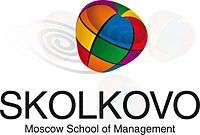 | |
Motto in English |
Helping successful people become more successful. Developing people able to develop themselves and the world. |
|---|---|
| Type | Business school |
| Established | 2006 |
| Endowment | $3 million (USD) |
| President | Andrei Sharonov |
| Location | Moscow, Moscow, Russia |
| Website | www.skolkovo.ru |
The Skolkovo School of Management is a graduate business school located near Skolkovo, Moscow Oblast, in the close vicinity of the capital city of Moscow, Russia. The school, which was founded in 2006, is a joint project by major Russian and international business leaders.
SKOLKOVO Business School is funded solely by its commercial activities and private investment. However, the idea of the school was supported by the Russian Government from the start. Dmitry Medvedev, the Prime Minister of the Russian Federation became the Chairman of the International Advisory Board for the School in 2006.
Key Figures:
- 1500 alumni;
- 150 world-class professors including core, adjunct, and visiting faculty from more than 10 countries;
- 6 research centres and 2 chairs;
- more than 1,300 guest speakers and lecturers;
- more than 100 published research papers;
- more than 12,000 attendees of corporate programmes;
- 100 corporate clients; and
- more than 150 mentor/mentee pairs in the SKOLKOVO Mentors’ Association.
History
2001 – Representatives of major Russian and foreign companies propose setting up a leading business school in Russia. Discussions start with Herman Gref, then-Russian Minister for Economic Development and Trade, and Presidential Administration officials.
2005 – Ruben Vardanian, Chairman of the Board of Directors and CEO of Troika Dialog Group, invites a group of like-minded entrepreneurs to participate in the project.[1]
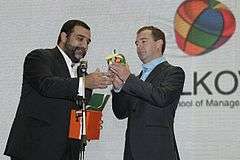
2006 – A meeting is held between the Russian businessmen and then-President Vladimir Putin. At the meeting, the President welcomes participation of major businesses in the educational reform and the initiative wins the Administration's support. Moscow School of Management Skolkovo project is set up as a public-private partnership within the framework of the National Priority Projects Programme of the Government of the Russian Federation.
September 2006 – Foundation stone ceremony is held on site. President Vladimir Putin attended the ceremony and confirmed that the Federal Government would provide support for the project, noting that the school would be funded with private money.Dmitry Medvedev, then Deputy Prime Minister of the Russian Federation, becomes the Chairman of the Skolkovo International Advisory Board.
December 2006 – Executive Education Company-Specific Programmes are launched.
October–December 2007 – Skolkovo presents its first research projects: the report on Russian Capital Market with NAUFOR and the ranking of Russian multinational enterprises.
June 2008 – Three individuals join the project as Founding Partners. The first-ever Skolkovo Forum "Doing Business in Russia: Fine Art of Success" is held. Skolkovo establishes the Skolkovo Institute for Emerging Market Studies (SIEMS) – a leading think-tank on fast-moving economies headed by Professor Seung Ho "Sam" Park and based in Beijing (China).
July 2008 – First books from the Skolkovo business literature series are published.
September 2008 – Enrollment for Skolkovo EMBA, the school's first degree programme, opens. Skolkovo EMBA is due to start in January 2009.
September 2009 - the full-time MBA (FT MBA) programme commenced. The first class consisted of 40 people (selected out of 107 applicants) from Russia and 12 foreign countries.
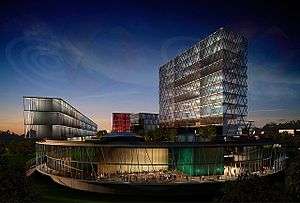
October 2008 – Russia's largest bank, Sberbank of Russia, supports Skolkovo development by granting the school a construction and development credit worth $245 million for the term of 10 years.
November 2008 – Skolkovo-2008 Ranking of Russian multinationals is released. Enrollment for Skolkovo MBA due to start in September 2009 opens. Skolkovo develops concept of Urals Federal University.
January 2009 – EMBA programme is launch. Studies of the first class start. Skolkovo MBA announces Skolkovo Challenge contest.
April 2009 – Skolkovo EMBA opens a new enrollment round. To-The-Point Roundtable series are open. Igor Shuvalov, First Vice-Prime Minister of Russia was a special guest of the first meeting.
In June 2012, the first class of Startup Academy started training, and in June 2013, Practicum for Directors, a programme for top-managers coming from medium-sized and small businesses, was launched.
In October 2014, the business school started an updated MBA programme in a modular format. The first intake of the renovated programme amounted to 40 people.
March 2016 - Launch of the SKOLKOVO MBA grant programme, the largest among the private business schools in Russia
September 2016 - SKOLKOVO signs a three-year cooperation agreement with the Business School of Hong Kong University of Science and Technology (HKUST) in the field of joint educational programmes, development of academic potential, and faculty exchange.
To date (August 2017), 1500 students of degree programmes and 12,000 corporate programme participants have completed their training at the Moscow School of Management SKOLKOVO.
Campus
All Skolkovo educational activities take place at a new campus located in Skolkovo, Moscow Oblast, few kilometers west of Moscow. The concept and the project of the campus were conceived by well-known British architect David Adjaye and reflect, as he puts it, ideas of the great artist Kazimir Malevich.[2][3]
Architectural project of Skolkovo campus was presented within the Russian pavilion exposition at the 11th Venice biennale[4][5]
- Construction work on the Skolkovo Campus officially started on September 21, 2006.
- September 2009—the entire complex of buildings was completed and the first classes were taught at the new Campus.
Skolkovo campus represents a disk with four different-sized buildings located on its roof. The main building, also known as the disk, features seven clusters named after the continents and BRIC countries. The Campus has 16 classrooms and 49 rooms for project and group work. Buildings on the roof are a dormitory, a hotel, an administrative building and a sports centre. \[6]
- Total area of the buildings—80,000 sq. metres.
- 550 parking spaces in the parking lots;
The SKOLKOVO Campus was shortlisted as one of the best Russian buildings of the last decade according to the daily British briefing The Calvert Journal. The journalists mentioned that the SKOLKOVO Campus building “is reflective of both the rebellious nature of Russian art and the innovation agenda of SKOLKOVO”.
Academics
| Business school rankings | |
|---|---|
| Worldwide MBA | |
| Financial Times[7] | NR |
One of the first SKOLKOVO International Advisory Board members was Lee Kuan Yew, the Minister Mentor of the Republic of Singapore.
Membership in Associations:
· European Foundation of Management Development (full member);
· American Chamber of Commerce;
· Association of European Business;
· UniCon;
· Russian Business Education Association;
· MediaX (Stanford University);
· EMBAC; and
· CEEMAN (International Association of Management Development in Dynamic Societies).
MBA
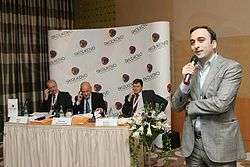
Skolkovo's first class in 2009 was made up of 45 students. Duration of the MBA program is 16 months.[8] Given Skolkovo's emphasis on learning by doing, each participant will be part of five projects in different fields:
- The Public Project involves analysis and submission of a proposal for development of either a particular geographic area, social infrastructure element or non-commercial organization in Russia.
- The International Project which takes place in India and/or China, is designed to provide students with hands-on experience in doing business in another business environment featuring cultural particularities.
- The Corporate Project is focused on a particular issue faced by an existing company.
- The USA Project allows to gain a fuller perspective by comparing business practices in vibrant economy such as Russia to those in more traditional economic systems.
- The Start-Up Project is dedicated to development of a business plan for implementation of an original idea, launch of a particular technology or technological innovation.
SKOLKOVO MBA [9] Admissions process is different from traditional Business Schools. The candidates are advised to prepare a video presentation instead of traditional essays. This would allow SKOLKOVO MBA Admissions team to evaluate the candidate's motivation to join the SKOLKOVO Community. After evaluating the candidate with video presentation, a personal interview is conducted by SKOLKOVO’s directors, founding partners and Alumni. The interview is conducted in a non-structured way.
Students from SKOLKOVO MBA[10] are mainly educated through taking part in real projects to be developed by teams of 5-7 people. Project results are assessed by the SKOLKOVO founders and third-party experts, government officials, businessmen, faculty and consultants). The School uses active methods of training, so the educational process includes a variety of training courses, role-playing games, training under the guidance of experts in specific areas, consulting projects, practical training and lectures. The core educational principle throughout SKOLKOVO MBA is learning-by-doing, which means that the students take part in action based projects and gain the experience via practice.
Some of the novel approaches used by SKOLKOVO MBA are real-life cases presented by CEOs, role-playing, experiential learning and immersive learning systems to supplement traditional business-school offerings like workshops, independent study tutorials and simulations and business games.
Executive MBA
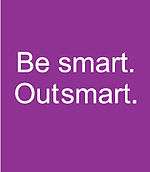
Launched in 2009, the EMBA program's first class was made up of 25 students. The format of the 18-month programme will allow the participants to stay in a full-time working process. The programme consists of 16 modules, starting in January 2009, and ending in June 2010, including 1 seven-day international module in China.
The large part of the programme is devoted to Leadership Development. Leadership practice course begins with assessment 360, which results in producing an individual Leadership Development plan jointly by a programme participant and his or her coach. Leadership practice also includes team coaching, stress management and skills upgrade in such aspects as communication, presentation, negotiation, conflict management, motivation and others.
Executive education
The school's executive education is aimed at short-term open-enrollment and company specific. The participants are involved in group discussions and work together in plenary sessions, interactive exercises and are able to share their own experience.
Thus far, the School has delivered more than 350 programmes for more than 95 corporate clients, including Russia’s largest corporations and industrial “blue-chips”, such as Lukoil, Rosatom, TNK BP, EVRAZ, and Gazprom.
In 2016 the SKOLKOVO-Rosatom educational programme won the EFMD Excellence in Practice Silver Award. See a brief description of the SKOLKOVO and Rosatom business case on EFMD website.
Research
Skolkovo research strategy and activities will be based on Centres of Excellence (COEs), with each of them focusing on a particular area of study and drawing its intellectual capital from different academic disciplines. The output performed by each centre will include publications that will be integrated into Skolkovo's educational programs.
Centres of Excellence (COEs):
- Skolkovo Institute for Emerging Market Studies (SIEMS) based in Beijing, China
Leading Think Tank on Fast-Moving Economies
SIEMS aims to be a leading think tank on fast-moving economies, with a special emphasis on Russia, China, and India. The Institute focuses on providing guidance to the society, corporate managers, and policy makers through knowledge creation across a broad range of areas including macro economy and public policy, industry and technology, and corporate strategies.
- Skolkovo Infrastructure Research Centre (SIRC)
SIRC is moving quickly to inaugurate four streams of work on the broad landscape of infrastructure-related research in the developing world. These four initiatives are:
- to launch deals with the issue of tertiary education in the developing world. The purpose of the initiative is to evaluate the performance of tertiary institutions in developing countries and develop the proper metrics for measuring the educational (i.e. both skill and capacity building) performance of these institutions;
- to explore the growth and evolution of financial infrastructure in the developing world;
- to design and start to populate a taxonomy of network configuration that sorts real-world experience using a variety of variables and aggregate consistent data over time on performance-related outcomes in developing economy environments;
- to a distinctive macroeconomic line of approach to cutting-edge issues in the broad area of physical infrastructure in the developing world – roads, bridges, electricity grids, logistics systems, and the like. The research will focus on the so-called "smart" infrastructure, i.e. impeding extensive systems of information technology and sensors into such physical infrastructure. The results of this work will be made available through normal scholarly channels, including curriculum development and seminars and conferences. Also, there will be equal emphasis on deploying SIRC research through hands-on workshops, advisory engagements, pedagogical interventions, “master classes,” and other such practitioner-focused activities.
Skolkovo research projects completed to date:
- "Skolkovo Rankings of Russian multinational enterprises" – a quantitative study of Russia's leading multinational enterprises, published in 2008 and 2007.[11][12][13]
- Concept development of the Federal University in Ural, Russia (2008).[14]
- "Russian Capital Market. Facts and Events" – analytical review of Russia's capital market published two times a year. The project is prepared in cooperation with the National Association of Securities Market Participants (NAUFOR).[15][16]
.
Publishing programme
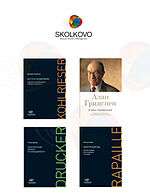
In 2008 Moscow School of Management Skolkovo launched its publishing programme. Its principles and key approaches were formulated in 2007 together with a decision on the set of major publishing products.
Works published by Skolkovo include writings by recognized business gurus translated into Russian, special editions of Russian authors in English, as well as reviews of the economic situation and market players' performance.
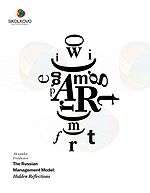
In July 2008 together with Alpina Business Books publishing house, Skolkovo launched its first series of business literature[17][18] in Russian that included books of world-renowned authors.
Skolkovo's first publishing product in the English language appeared in March 2008. "The Russian Management Model: Hidden Reflections", a book by Alexander Prokhorov, issued in English, was presented in Singapore at the III Russia-Singapore Business Forum. Apart from releasing business literature items, Skolkovo cooperates with National Association of Securities Market Participants (NAUFOR) and publishes jointly prepared "Russian Capital Market. Facts and Events" review. Together with NAUFOR, Skolkovo plans to follow Russian capital market trends. Given the school's focus on international activities and, in particular, on emerging markets, Skolkovo is considering opportunities to conduct similar projects on financial markets in India and China in cooperation with the school's foreign partners.
People
Founders and administrators
Skolkovo Founders are 17 Russian and international individuals and businesses.[19][20] The business include companies like Credit Suisse, GUM Trade Center, Severstal, TNK-BP, and Troika Dialog. The founding invdividuals include Alexander Abramov, Roman Abramovich, and Ruben Vardanian.The partnership is not limited to their financial contribution as investors: the cumulative management experience of the founders, who are actively involved in the educational process, exceeds 200 years.
The school chose a specific form of administrative management. SKOLKOVO is jointly managed by President Andrei Rappoport (until 2011, Ruben Vardanian) and Dean Andrei Sharonov (until 2013, Andrei Volkov).
See also
- Association to Advance Collegiate Schools of Business (AACSB)
- European Foundation for Management Development (EFMD)
External links
- Official site
- National Priority Projects Programme: Education (in russian)
- Speech by Mr Goh Chok Tong, Senior Minister, at Skolkovo Business Forum
- Images of a Future School – Andrei Volkov about the problems and prospects of training managerial personnel
- Web camera on Skolkovo construction site
- Skolkovo construction site video
- Real life MBA for the emerging market
References
- ↑ Moscow's New School Looks West, Financial Times, September 17, 2006
- ↑ ; Kommersant ("Коммерсантъ") № 176(3993), September 30, 2008 (in russian)
- ↑ ; The Times. Russia’s lessons in capitalism, November 16, 2008
- ↑ La Biennale di Venezia: Architecture: Russian Pavilion
- ↑ Skolkovo Campus Project Presented at 11th Venice Biennale, www.skolkovo.ru
- ↑ Adjaye Associations
- ↑ "Global MBA Ranking". Financial Times. 2017. Retrieved 2017-01-31.
- ↑ Skolkovo FTMBA FAQs, www.skolkovo.ru
- ↑ Interview with SKOLKOVO MBA Admissions Team
- ↑ SKOLKOVO MBA
- ↑ Russian Firms Invest Abroad, The Moscow News
- ↑ Release of the Skolkovo-2008 ranking of Russian multinational enterprises, www.skolkovo.ru
- ↑ Release of the Skolkovo-2007 ranking of Russian multinational enterprises, www.skolkovo.ru
- ↑ Skolkovo Developed Concept of Urals Federal University, www.skolkovo.ru
- ↑ ; "Russian Capital Market. Facts and Events"-2007, www.skolkovo.ru
- ↑ "Russian Capital Market. Facts and Events"-2008, www.skolkovo.ru
- ↑ Skolkovo and Alpina Business Books Launch a Joint Publishing Project, PR-inside.com
- ↑ ; E-Perspektiva.com (in russian)
- ↑ Moscow's Soon-to-Be Global B-School, Business Week, March 31, 2008
- ↑ Russia Launches New Elite Business Schools, RussiaBlog
Coordinates: 55°41′34″N 37°23′08″E / 55.6926638989°N 37.3854888989°E